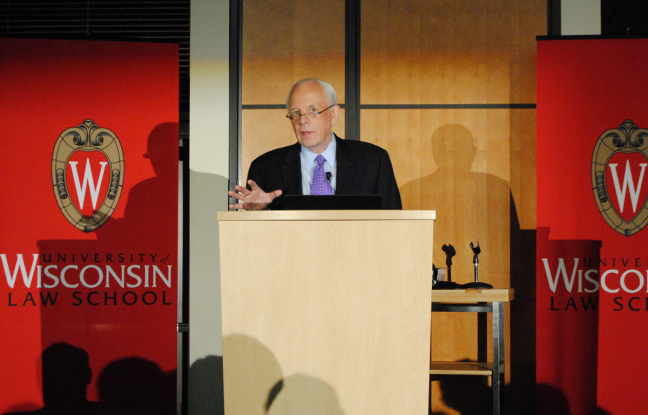In a taped conversation, former White House counsel to President Richard Nixon, John Dean is heard confronting Nixon about the Watergate Scandal.
On the tape, Dean tells Nixon he intends to have him end the cover-up, Nixon responds and says he knows where to get $1 million dollars in cash and Dean leaves the meeting to continue his work per usual. The tape became a key element in the undoing of Nixon’s presidency.
From the cover-up, to the containment, to the unraveling, Dean described his involvement as the key witness for the Watergate scandal hearings in a campus lecture Friday for the University of Wisconsin Law School’s annual Kastenmeier Lecture.
Dean said he felt he was being used as a scapegoat when Nixon announced Dean was conducting an investigation and began to cooperate with Watergate investigators.
“This was the first I heard of my investigation … that’s when I thought you might be being set up since I hadn’t conducted this,” Dean said.
There was a lot of pressure to write a “bogus” report, Dean said, adding that his refusal to do so got him fired.
It was this boundary of entering into criminal acts that Dean spoke about during the lecture. Dean said there were many reasons lawyers and counselors crossed the line into criminal acts during Watergate.
One reason, he noted, was incompetence. No one on the counsel had any experience with criminal law and were not qualified to deal with it, Dean said.
“I must say I did not know the criminal law … and I reported back, I do not know anyone on our staff who has experience with criminal law,” Dean said.
Another reason: the unwavering loyalty to the client, particularly with the president who could do nice things for people if they served him well.
There was also confusion of attorney-client privilege when representing an entity, Dean said. White House counsel represents the office of the president, not the president himself, he said.
In addition, there was arrogance toward the law and some people inside the White House thought themselves to be above the law, Dean said.
White House counsel also dealt with a “loss frame mentality”, where decision makers are more likely to take risks, Dean said.
The best way to deal with loss frame mentality is to bring in an outsider who is not in the loss frame to get an objective viewpoint on the best way to handle to situation, Dean said.
Dean said none of Nixon’s handlers told him he was handling the situation incorrectly or tried to persuade him to confess his wrongs and ask the American people for forgiveness. However, according to Dean, even if they had, it would not have been effective.
It is clear that Nixon knew about the cover-up from the first week, not everything, but little things and that would have blown his entire defense away, Dean said. That is probably the information on the tapes and it has been blown up to be a much bigger deal than it is, he added.
All in all, Dean said the handling of the Watergate scandal resulted in the American Bar Association reevaluating how ethics are taught in law school.
Today, the ABA requires a mandatory teaching of ethics in law school, a special ethics bar examination and the Kutak Commission, which are model rules, Dean said.













